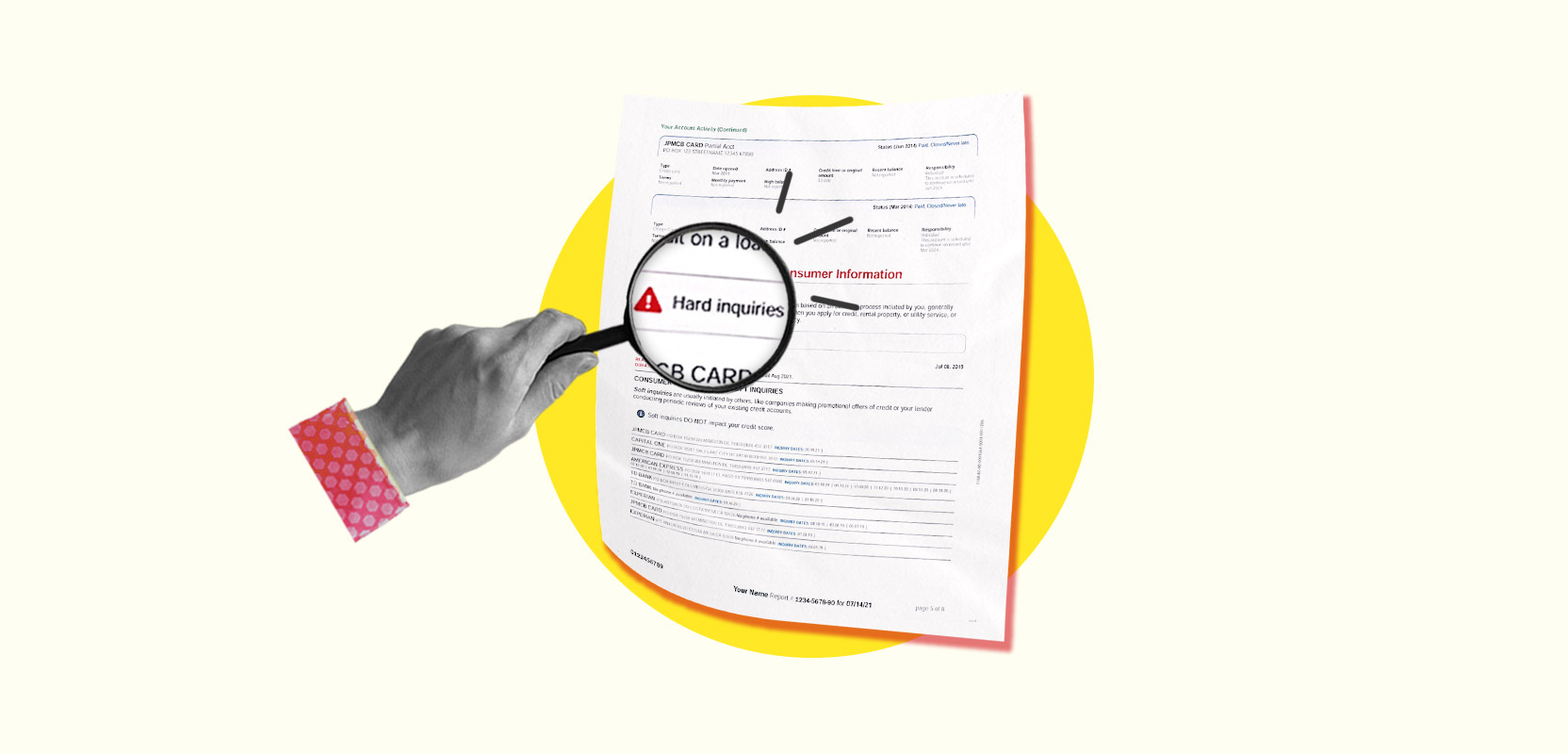Home>Finance>How Much Of A Grace Period Do You Get For Multiple Hard Inquiries


Finance
How Much Of A Grace Period Do You Get For Multiple Hard Inquiries
Modified: March 4, 2024
Learn about the grace period for multiple hard inquiries on your credit report. Understand how it impacts your finances and credit score. Gain insights on managing multiple inquiries.
(Many of the links in this article redirect to a specific reviewed product. Your purchase of these products through affiliate links helps to generate commission for LiveWell, at no extra cost. Learn more)
Table of Contents
- Understanding the Impact of Multiple Hard Inquiries on Your Finances
- What Are Hard Inquiries?
- Understanding the Ramifications of Multiple Hard Inquiries
- Understanding the Time Frame and Mitigation Strategies
- Strategies for Minimizing the Impact and Rebuilding Credit
- Navigating the Impact of Multiple Hard Inquiries with Informed Financial Management
Introduction
Understanding the Impact of Multiple Hard Inquiries on Your Finances
When you apply for credit, whether it's a mortgage, auto loan, or credit card, the lender will likely perform a credit inquiry to assess your creditworthiness. These inquiries can be categorized as either "soft" or "hard." While soft inquiries have no impact on your credit score, hard inquiries can affect it.
Understanding the nature and implications of hard inquiries is crucial for maintaining a healthy financial profile. In this article, we will delve into the concept of hard inquiries, explore their potential impact on your financial standing, and shed light on the grace period associated with multiple hard inquiries.
Let's embark on a journey to unravel the intricate dynamics of hard inquiries and gain insights into how they can influence your financial well-being. Whether you're a seasoned borrower or just starting to navigate the realm of credit, this exploration will equip you with valuable knowledge to make informed decisions and navigate the credit landscape with confidence.
Understanding Hard Inquiries
What Are Hard Inquiries?
Hard inquiries, also known as hard pulls, occur when a financial institution, such as a lender or credit card issuer, checks your credit report as part of the decision-making process for a credit application. These inquiries typically take place when you apply for a new line of credit, such as a loan or credit card. Unlike soft inquiries, which may occur during background checks or pre-approval processes and do not impact your credit score, hard inquiries are visible to other creditors and can influence your creditworthiness.
Hard inquiries provide lenders with a comprehensive view of your credit history, allowing them to assess the level of risk associated with extending credit to you. They encompass details such as your payment history, outstanding debts, length of credit history, types of credit accounts, and recent credit inquiries. It’s important to note that while a single hard inquiry may have a marginal impact on your credit score, the cumulative effect of multiple inquiries within a short timeframe can potentially lower your score.
As a borrower, being mindful of when and why hard inquiries are made on your credit report is vital. By understanding the nature of hard inquiries and their implications, you can make informed decisions about credit applications and strategically manage your credit profile to maintain financial stability and favorable credit standing.
Impact of Multiple Hard Inquiries
Understanding the Ramifications of Multiple Hard Inquiries
When multiple hard inquiries appear on your credit report within a short timeframe, they can signal heightened risk to potential lenders. This can have several implications for your financial standing, including:
-
Credit Score Impact: Each hard inquiry can cause a temporary dip in your credit score, typically by a few points. While a single inquiry may have a minimal effect, the cumulative impact of multiple inquiries can be more substantial, potentially leading to a noticeable decrease in your score.
-
Perceived Risk: Lenders may interpret multiple inquiries as a sign of financial distress or desperation, potentially affecting their willingness to extend credit to you. This perception of heightened risk could result in less favorable loan terms or even outright rejection of credit applications.
-
Long-Term Implications: Although hard inquiries remain on your credit report for up to two years, their impact on your credit score diminishes over time. However, a flurry of recent inquiries can raise concerns about your financial stability and responsible borrowing habits, potentially influencing lenders’ decisions for an extended period.
It’s important to recognize that while the impact of multiple hard inquiries can be significant, it is not irreversible. By understanding how these inquiries affect your credit profile, you can take proactive steps to mitigate their impact and work towards rebuilding your creditworthiness.
Grace Period for Multiple Hard Inquiries
Understanding the Time Frame and Mitigation Strategies
When it comes to the impact of multiple hard inquiries on your credit score, there is a built-in grace period that allows for rate shopping and minimizes the impact of inquiries within a specific timeframe.
The grace period typically ranges from 14 to 45 days, during which multiple inquiries for the same type of credit—such as a mortgage, auto loan, or student loan—are treated as a single inquiry when calculating their effect on your credit score. This provision acknowledges that individuals may apply for several loans within a short window to secure the best terms without being unfairly penalized for each application.
It’s important to note that while these inquiries are grouped together for scoring purposes, they still appear individually on your credit report, ensuring transparency for potential lenders. This means that even within the grace period, the inquiries are visible and can influence lenders’ assessments of your creditworthiness.
Understanding the existence of this grace period empowers consumers to make informed decisions about credit applications without undue fear of damaging their credit scores. By consolidating loan applications within the specified timeframe, borrowers can take advantage of competitive loan offers while minimizing the impact on their credit profiles.
Moreover, leveraging the grace period strategically can help individuals navigate major financial decisions, such as securing a mortgage or auto financing, with confidence, knowing that their credit scores will not be unduly penalized for prudent rate shopping.
While the grace period offers a buffer for rate shopping, it’s essential to approach credit applications judiciously and avoid excessive inquiries, as the cumulative impact can still affect your creditworthiness and borrowing capabilities.
Managing Multiple Hard Inquiries
Strategies for Minimizing the Impact and Rebuilding Credit
Effectively managing multiple hard inquiries involves proactive steps to mitigate their impact and restore your credit standing. Consider the following strategies to navigate the aftermath of multiple inquiries:
-
Strategic Rate Shopping: Capitalize on the grace period to consolidate loan applications within a short timeframe when shopping for major loans, such as mortgages or auto loans. This approach allows you to compare offers without incurring substantial credit score reductions due to multiple inquiries.
-
Timely Payments: Emphasize punctual repayment of existing debts to demonstrate responsible financial behavior. Consistently meeting payment deadlines can offset the negative impact of inquiries and contribute to an upward trajectory in your credit score.
-
Limit New Credit Applications: Exercise restraint when applying for new credit, especially in the aftermath of multiple inquiries. Minimizing the frequency of credit applications can prevent further erosion of your credit score and signal responsible borrowing habits to potential lenders.
-
Regular Credit Monitoring: Stay vigilant by monitoring your credit report for inaccuracies or unauthorized inquiries. Promptly addressing any discrepancies can safeguard your credit standing and prevent potential damage from unauthorized or erroneous inquiries.
-
Patience and Persistence: Recognize that the impact of multiple inquiries is not permanent. Over time, their influence on your credit score diminishes, especially as you exhibit prudent financial behavior and limit new credit applications.
By implementing these strategies, you can navigate the challenges posed by multiple hard inquiries and work towards rebuilding your credit strength. While the initial impact may be concerning, proactive credit management and responsible financial habits can pave the way for a positive credit trajectory.
Conclusion
Navigating the Impact of Multiple Hard Inquiries with Informed Financial Management
Understanding the implications of multiple hard inquiries is paramount for individuals seeking to maintain a healthy credit profile and make informed financial decisions. While these inquiries can temporarily affect credit scores and influence lenders’ perceptions, strategic approaches and a comprehensive understanding of the credit landscape can mitigate their impact.
By recognizing the existence of a grace period for rate shopping and leveraging it judiciously, borrowers can explore loan options without incurring undue credit score reductions. Additionally, proactive credit management, such as emphasizing timely payments and limiting new credit applications, can contribute to the gradual restoration of credit strength following multiple inquiries.
It’s essential to approach credit applications with prudence, understanding that each inquiry carries potential ramifications for creditworthiness. Regular credit monitoring and swift resolution of any inaccuracies or unauthorized inquiries are fundamental in safeguarding one’s credit standing.
While the immediate aftermath of multiple hard inquiries may pose challenges, patience and persistence, coupled with responsible financial behavior, can pave the way for a positive credit trajectory. By implementing strategic rate shopping, emphasizing timely payments, and exercising restraint in credit applications, individuals can navigate the impact of multiple inquiries and work towards rebuilding their credit strength.
Ultimately, informed financial management and a proactive approach to credit can empower individuals to transcend the temporary setbacks posed by multiple hard inquiries, positioning them for long-term financial stability and favorable credit standing.














